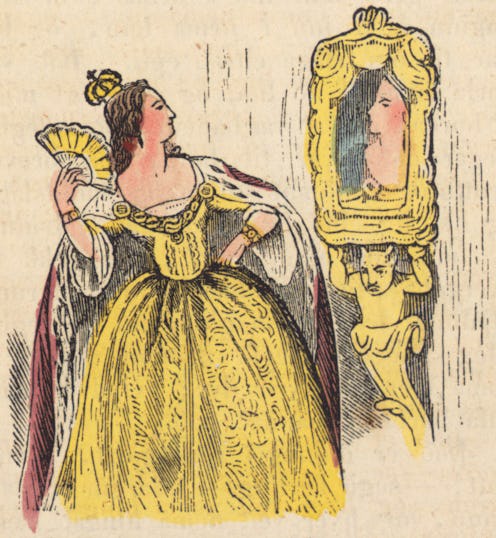Life
4 Surprisingly Feminist Fairy Tale Tropes

Classic fairy tales aren't exactly known for being feminist. Between the damsels in distress, knights in shining armor, and basis in outdated, traditional morals, looking for feminist fairy tale tropes seems like a lost cause — the kind that would require the help of a fairy godmother to have any hope of success. Well, consider me your feminist fairy godmother for the day, because that's exactly what we're about to discuss.
Of course, there's no denying that many fairy tales are rife with misogyny, especially in the sanitized versions recorded by Charles Perrault and the Brothers Grimm — and yes, the often-violent versions written by the Grimms were actually less graphic than their original forms. Beginning with these early adaptations and continuing with Walt Disney's midcentury animations, many of the fairy tales we know and love today are stripped of their violence and sexual content in an effort to make them more appropriate for children — and for the same reason, such content is usually replaced by overarching moral themes that reflect the traditions of the time.
Perhaps one of the best examples is also the most ubiquitous: Cinderella. In the Brothers Grimm's tale, "Aschenputtel," our protagonist takes care of business on her own: She figures out a way to get to the ball without the help of a fairy godmother (although she is aided by some friendly flora and fauna, natch); she ditches the prince when she feels like it; and she takes the time to wash up when the prince arrives at with her slipper, just to make absolutely sure he recognizes her. Compare that to a few other versions, in which everything happens to Cinderella rather than the other way around.
In short, fairy tales change depending on who's telling them, and sometimes, the interpretation is more feminist than you'd expect. Let's take a look at four feminist fairy tale tropes below.
1. The Fairy Godmother
One of the most important tenets of feminism is to support other women, and fairy godmothers make their living by doing exactly that. Whether they're granting wishes, doling out advice, or putting an entire castle to sleep so Sleeping Beauty won't wake up lonely, fairy godmothers have the "ladies supporting ladies" business down to a science. (It should also be noted that they're a relatively recent trope, but the point still stands.)
2. The Protagonist's Helper
Hear me out on this one. Would it be a zillion times better for there to be more female protagonists? Of course. But trope of the beautiful maiden, wizened old crone, or kind giantess who aids the protagonist can be feminist, in certain circumstances — namely, when they're helping out against someone else's wishes or going against the norm. In most versions of "Jack and the Beanstalk," for example, Jack is only saved by the grace of the ogre's wife, who hides the boy so her husband won't find and eat him. These women aren't biddable servants to the men in their lives; they're doing what's right because they feel like it.
3. The Proud Beauty
In fairy tales, the arrogant are almost always punished for their pride, and the proudly beautiful princess, who sets impossible tasks for suitors in the hopes that she'll never have to marry, is no different. However, that doesn't change the fact that she's aware of her own worth and refuses to compromise... until her dad marries her off to a pauper as punishment, but we're not talking about that.
4. The Evil Stepmother/Witch
Similarly to the proud beauty, the evil stepmother and her sister, the evil witch, are ladies who couldn't care less about what society thinks of them. They put themselves first, traditional gender roles be damned, and while they're usually stirring up trouble for other women rather than supporting them, they're certainly never going to back down and let men tell them what to do. If they would just learn to work with other women instead of steamrolling over them, there would be much fewer damsels in distress going around.
Fairy tales being what they are, these women are generally punished for stepping out of line — but the evil witches and stepmothers are the closest most stories get to feminist characters.
Images: Wikimedia Commons; Giphy (5)